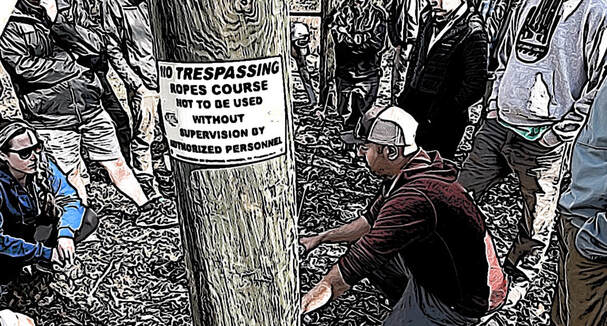|
I recently received an email from a team builder that I think is worth sharing with you (permission was given to share). I've worked at, with and for a lot of different programs over the years and this topic surfaces with everyone - what do we 'call' what we're doing?
Here's the email: Hi Chris,
Have you ever lived this concern or heard someone else voice it? Have you asked anyone for their answer to this concern? I have heard this response more than once: "We don't call it 'team building' any more, because the term has fallen out of favor with a lot of people, so we call our program......(pick any other related descriptor for what we do, it's been tried)."
Team Building I'd like to start with the term, team building. I've tried 'selling' other terms (e.g., community building, group development, and adventure learning to name a few), but let's face it - team building sums up what we do. It's a term people know. And, many of these people have had great team building experiences. So, I'm sticking with it. I've been on a mission over the years to bring 'team building' back into a positive light. One way I'm doing this is to educate people (my students, clients and program participants) about the different kinds of 'team' programs that are possible. (Myself and others believe the term, 'team building' has fallen out of favor because some entities call any sort of team or group program, team building - and, in reality, no team building occurs.) In a past OTB blog post, A Typology of Team Interaction, I advance the work of others about the difference between Team Bonding, Team Building and Team Development programs. If we are better able to fit one of these specific programs to our group's needs, the outcomes can be more aligned with participant expectations. And then of course, we must provide 'bonding,' 'building' and 'development' experiences that make an impact so people know why they gave up their time for your program. (If the 'why' isn't answered, it's likely people will walk away with a low-impact experience.)
Ropes or Challenge Course (The Noun)
Let's move to the "what are we calling it" trend (the noun). Today, two of the most (dare I say) generic names for the 'facilities-based adventure education' (Prouty, Adventure Education: Theory and Applications) tools we work with are a, 'Challenge Course' and a 'Ropes Course' (a lot of the course signage you see, like in the picture above, will say, Ropes Course based on traditional language used in the field). These courses can be lows only, highs only or a combination of both. I have chosen to go with the 'challenge course' label, based on my alignment with The Association for Challenge Course Technology and the use of the term in their current ANSI/ACCT 03-2019 Challenge Course and Canopy/Zip Line Tours Standards. If you align with PRCA, the Professional Ropes Course Association, then you might be a 'Ropes Course' person. The name (the noun) for the tool, in my opinion, is not as important as what (the verb) the tool can do for an individual, a team or a group. Naming What We're Doing (The Verb) Reading (into) R.s email, there is:
Let's flip these perspectives, and start with the marketing - getting people interested in your program. I am in the Seth Godin camp (author of, This is Marketing). Here is some content from the book that can give us Godin's initial perspective: Marketing is the act of making change happen...You haven't made an impact until you've changed someone. [We certainly can agree we are after this outcome in our 'building' and 'development' programs.] Effective marketing now relies on empathy and service...[it] is the generous act of helping someone solve a problem. Their problem. It's a chance to serve. Marketing...involves creating honest stories - stories that resonate and spread. Marketers offer solutions, opportunities for humans to solve their problems and move forward. Godin's 'new' marketing is about building trust by providing products/services that solve problems (not by first creating a product and then trying to sell it - as in traditional marketing practices). We know, as challenge/ropes course practitioners we are in the business of helping solve problems - helping others learn and grown (in the growth types of programs). The questions is, do we have the skills and abilities to first uncover the 'problems' and then actually help 'solve' them. These questions can be answered by the organization and the team builder. Where does the organization fit in? This could be a very long answer, but let's summarize with some considerations. First-and-foremost, who 'is' the organization and who ultimately makes the decisions? Who are the stakeholders? Do these stakeholders adhere to (recognize, even know about) the Standards within the challenge/ropes course industry? For example, are these stakeholders considering: B.1.2. The organization shall represent itself, and market its products and services, accurately to the public, and B.1.4. The organization and its staff shall operate within the bounds of their organizational and individual competencies. (ANSI/ACCT 03-2019 Standards) Organizations want to thrive and keep the doors open, this is a given. Economic stability is important. Are the stakeholders making decisions based on economics or common practices in the field (that guide us towards offering exceptional programs that will not fall out of favor with participants). Is the organization, 'operating within their competencies?' I'm for running exceptional programs within my competencies so every group I work with will spread the word that team building can be an amazing life-changing experience. Finally, there is the team builder designing and running the programs. Back to the ANSI/ACCT Standards: C.1.2. Staff shall operate within the limits of their technical and interpersonal/program management skill level, and C.2.1.3. Staff shall conduct activities according to the organization's guiding policies, procedures and practices. (Just two Standards examples.) The way I see it, whatever you are going to call your program, it is (very) important to have people (staff) who can 'solve the problem(s)' the client is bringing so trust can be forged (and return business and positive word of mouth can grow). If a client is interested in having some adventurous team bonding fun, are there competent staff to design and deliver such a program? (How do you know?) If a client wants to find out some of the blind spots in her organization, are there staff who can design and deliver an experience (team building) that will bring out and test functional (or dysfunctional) group behaviors and be able to process some transfer of learning to the organization's growth or next action steps? (How do you know you have the staff?) If a client wants to practice the behaviors that lead to being more productive (team development), are there staff that can do this? (How do you know?) For me, when 'naming' a service (or product), it comes down to what the staff (the ones in front of the clients) can deliver - can promise and deliver. It took me a while to solidify my own platform - what I can promise and deliver. I train team builders. Are you, and/or your staff, team builders? Yes. What skills and abilities do you and/or your staff bring in confidently to a team building program? Awesome! What can you and/or your staff do a little bit better on when it comes to planning, leading and processing a team building program? Let me tell you how we can work together to increase your skills and abilities in these areas. I have to know my limits (skills and abilities) so I can, "offer solutions, opportunities for [my clients] to solve there problems and move forward." This is what brings people back to us, keeps the doors open, and gives team building a better reputation. Name it and then deliver what you promise!! R., maybe not as "few" words as you were after, but I hope there are some things that can help you move forward. I have yet to find anyone with 'the' answer to this query, we've got to keep doing the good work no matter what we (at times, have to) call it.
We'd love to read your thinking on this one - leave us a Comment.
Be well!! Keep me posted. Chris Cavert, Ed.D.
Would you like a (super) quick email notification when new OTB content (blog post or podcast episode) is available? Fill out the form below and we'll let you know.
0 Comments
Your comment will be posted after it is approved.
Leave a Reply. |
OnTeamBuilding is a forum for like-minded people to share ideas and experiences related to team building. FREE Team Building
Activity Resources OTB FacilitatorDr. Chris Cavert is an educator, author and trainer. His passion is helping team builders learn and grow. Archives
January 2024
|



 RSS Feed
RSS Feed